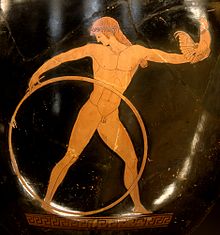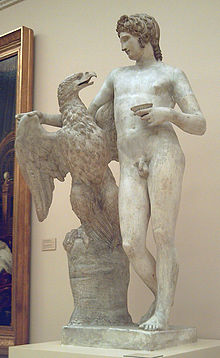"In Greek mythology, Ganymede (Greek: Γανυμήδης, Ganymēdēs) is a divine hero whose homeland was Troy. Homer describes Ganymede as the most beautiful of mortals. He was the son of Tros of Dardania, from whose name "Troy" was supposed to derive, and ofCallirrhoe. His brothers were Ilus and Assaracus. In one version of the myth, he is abducted by Zeus, in the form of an eagle, to serve as cup-bearer in Olympus. The myth was a model for the Greek social custom of paiderastía, the socially acceptable erotic relationship between a man and a youth. The Latin form of the name was Catamitus, from which the English word "catamite" derives.[1]"
"In Olympus, Zeus granted him eternal youth and immortality and the office of cupbearer to the gods, supplanting Hebe. Edmund Veckenstedt associated Ganymede with the genesis of the intoxicating drink mead, which had a traditional origin in Phrygia.[5] All the gods were filled with joy to see the youth, except for Hera, Zeus's consort, who regarded Ganymede as a rival for her husband's affection. Zeus later put Ganymede in the sky as the constellation Aquarius, which is associated with that of the Eagle (Aquila). A moon of Jupiter, the planet named for Zeus's Roman counterpart, was named Ganymede by modern-era astronomers.
Ganymede was afterwards also regarded as the genius of the fountains of the Nile, the life-giving and fertilizing river. Thus the divinity that distributed drink to the gods in heaven became the genius who presided over the due supply of water on earth."
"Plato accounts for the pederastic aspect of the myth by attributing its origin to Crete, where the social custom of paiderastía was supposed to have originated (see "Cretan pederasty").[6]He has Socrates deny that Ganymede was the "catamite" of Zeus, and say the god loved him non-sexually for his psychē, "mind" or "soul," giving the etymology of his name as ganu-, "taking pleasure," and mēd-, "mind." Ganymede, he points out, was the only one of Zeus's lovers who was granted immortality.[7]"
Dimensions height 39 cm
width 35 cm
depth 5 cm
"In poetry, Ganymede became a symbol for the beautiful young male who attracted homosexual desire and love. He is not always portrayed as acquiescent: in the Argonautica of Apollonius of Rhodes, Ganymede is furious at the god Eros for having cheated him at the game of chance played with knucklebones, and Aphrodite scolds her son for "cheating a beginner." The Augustan poet Virgil portrays the abduction with pathos: the boy's aged tutors try in vain to draw him back to earth, and his hounds bay uselessly at the sky.[8] The loyal hounds left calling after their abducted master is a frequent motif in visual depictions, and is referenced also by Statius:

Roman-era relief depicting the eagle, Ganymede wearing his Phrygian cap, and a third figure, possibly his grieving father

Ganymede rolling a hoop and bearing aloft a cockerel, a love-gift[10] from Zeus, who is pictured in pursuit on the obverse of a vase by the Berlin Painter (Attic red-figurekrater, 500–490 BC)

Ganymede (1804) by José Álvarez Cubero


The Abduction of Ganymede (ca. 1650), by Eustache Le Sueur






